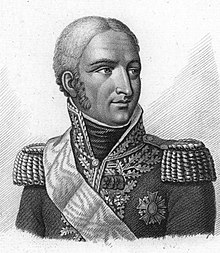Jean Joseph Paul Augustin Dessoles
Jean Joseph Paul Augustin Dessoles or Jean-Joseph Dessolle (born October 3, 1767 in Auch ; † November 3, 1828 in the Château de Monthuchet , Saulx-les-Chartreux , Essonne department ) was a marquis and French general.
Life
Dessoles came from an old noble family. At the age of 25, Dessolles served as a captain in the Western Pyrenees Army in 1792 and then joined the General Staff as an adjutant to General Jean-Louis-Ebenezer Reynier . In October 1793 Dessolles was appointed adjutant general and as such took part in Napoleon's Italian campaign three years later . For this he was personally honored by Napoleon. Promoted to Général de brigade in 1797 , he commanded a reserve corps in Italy in 1798 and entered Turin with his division on December 7th .
In March 1799 Dessolles crossed the Stelvio Pass with 4,500 soldiers to support General Claude-Jacques Lecourbe . After the battle at Finstermünz in the Inn Valley, Austrian troops ran into difficulties near Glurns and Taufers , and Dessolles was able to decide the “Meeting of Santa Maria” for France on April 13, 1799.
For this victory he was promoted from the directorate to general de division . As Chief of the General Staff of the High Command of the Italian Army, he showed brilliant bravery in the Battle of Novi , commanded the troops in Genoa towards the end of the campaign and was appointed Chief of the General Staff of the Rhine Army at the request of General Jean-Victor Moreau . Dessolles was able to excel in the battle of Hohenlinden and when crossing the Inn and Salza .
When the Treaty of Lunéville was signed in December 1801 and came into force, the First Consul Napoleon Bonaparte wanted to appoint him a Council of State, Secretary of War and a member of the Board of Directors. Dessoles, however, declined out of attachment to Moreau. In 1803, when it came time to remove Moreau's friends, he was sent to Hanover to take over a division under the command of General Édouard Mortier .
When all civil and military authorities sent congratulatory addresses to the First Consul when the trial of Moreau opened, Dessoles was one of the few who failed to do so. Bonaparte never completely forgave him for this, although he appointed him Grand Officer of the Legion of Honor in 1804 and Governor of the Palace of Versailles in 1805 .
In 1808 Dessolles was given command of an army division during the war in Spain . There he distinguished himself in the battle of Ocaña and in the transition over the Sierra Morena . On January 18, 1810, he made his entry into Córdoba and became governor of Córdoba.
Inconsistent with Napoleon's system, he withdrew again from the service and into the country. Appointed chief of the general staff in the army of the Viceroy of Italy Eugène de Beauharnais in 1812 , he obtained his dismissal during Napoleon's Russian campaign after the conquest of Smolensk and lived in seclusion on a country estate near Paris until the Restoration . After the return of the Bourbons , he was taken over by King Louis XVIII. appointed minister of state and peer of France and at the same time entrusted him with command of all national guards. But since he showed himself to be a staunch supporter of constitutional ideas, he resigned from command.
On December 29, 1818 he took over the administration of foreign affairs as well as the chairmanship of the liberal-constitutional ministry formed by Decazes and was raised by the king to marquis . However, he resigned from the ministry as early as 1819 because he did not approve of Decazes' indulgence to the reaction . Under the ministry of Jean-Baptiste de Villèle , he was also deleted from the list of ministers of state in 1822.
Jean Joseph Paul Dessolles died on November 3, 1828 in Montluchet and rests in the Père-Lachaise cemetery in Paris (28th division).
Honors
His name is entered on the triumphal arch in Paris in the 15th column.
Web links
| predecessor | Office | successor |
|---|---|---|
| Armand-Emmanuel du Plessis, duc de Richelieu |
Foreign Minister of France December 29, 1818 - November 19, 1819 |
Étienne-Denis Pasquier |
| personal data | |
|---|---|
| SURNAME | Dessoles, Jean Joseph Paul Augustin |
| ALTERNATIVE NAMES | Dessoles, Jean Joseph Paul; Dessolle, Jean-Joseph |
| BRIEF DESCRIPTION | Marquis and French general |
| DATE OF BIRTH | October 3, 1767 |
| PLACE OF BIRTH | Also |
| DATE OF DEATH | November 3, 1828 |
| Place of death | Château de Monthuchet , Saulx-les-Chartreux , Essonne department |
